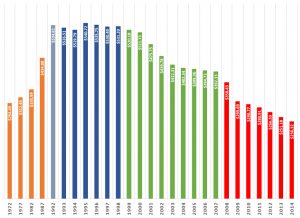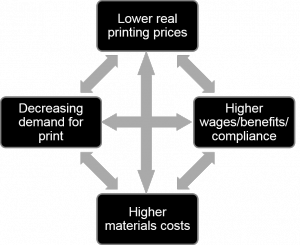What people experience based on the time they were born shapes their outlook and business strategies for years to come.
What people experience based on the time they were born shapes their outlook and business strategies for years to come.
If you were born in the 1940s, grew up in the 1950s and 1960s, and then owned or ran a printing business, your career has already shifted into retirement or is about to do so. Through your life, especially if it was a family business, you likely experienced a growing industry, resilient in times of economic recession, and booming in strong economies. Technology lowered your costs, and increased your market potential. Technology was not a threat; it was a tool to internal improvement, operations growth and profits.
If you were born in the 1970s, your experience was different. You used computers not just in college, but in elementary and high school, and home. You might chuckle as you remember the big
Gordon Gekko cell phone from the movie
Wall Street, but you know it as a constantly evolving device that gets better and better. You've always worked with desktop publishing and desktop photo manipulation. While you know offset processes through and through, you believe that digital printing can offer quality printing with some interesting flexibility and unique capabilities. Technology lowered your costs, but it also created new and aggressive digital media competitors. Technology was changing demand for your core products. You've never seen a booming printing industry, but learned in the trenches that you have to do something special and unique for clients to attract and keep their interest.
The 1940s-born executives saw per capita commercial printing consumption rise to over $500 in the 1990s. Those born thirty years later have seen it shrink to less than half that amount. (click chart to enlarge)

Is there any doubt that the long-term experiences of the older generation led them to discount the competition of digital media, as well as the opportunities it might offer? There was always a sense that any declines in demand would rebound higher, given time.
I've seen the difference in a personal way. Ten years ago, younger execs would walk up to me at trade shows and say “I read your book, and talked about to our president/CEO/owner and I can't get them to listen.” Those frustrated execs are now in charge. Now I hear “thanks for your book, we've been using it in our meetings.” It's even better when they say “your book is out of date.” That tells me they read it and thought about it. Then they say “Let me tell you what we've been doing instead.”
This chart shows the challenges that today's print businesses are dealing with (click to enlarge).

How has the newer generation of print executives thrived in this vastly different environment? These are a few things they have done:
- New product offerings that are strategic and not just “add-on” billables
- Business development rather than sales
- Restructured sales processes around new media and web-to-print
- Pursued forward-looking consolidation, adding new markets and capabilities
- Participated in tuck-ins that added customers who could be traded up to their new offerings
- Started separate agency-like businesses
- Invested in digital workflows
- Operations improvement to doing the essential things really well
- Reduced leverage and overall borrowing
- Reduced fixed costs that were designed for a different era
- Product mix rebalancing to reflect market needs not company needs
- Create new demand for new products
- Lower print prices led to a focus on it's about delivering measurable results that helps client reach their defined objectives, so skill at meeting the objectives set the price, not the materials
- Dealt with higher wages with more training, more productivity, creating greater value for greater wages
- Higher materials costs stimulated interest in improved inventory management, better supplier relationships, better operations, focus on products that had greater market value
The generational shift that is underway is creating a different, more flexible, and more resilient industry. While many of the total industry data like industry shipments and employment appear stagnant, there are print businesses that are moving strongly in the opposite direction. Today's managers can't ride a wave of general economic growth, and I believe, are much better managerial talent than is assumed, and more insightful than their predecessors.
When you ride a rising economic tide, it's easy to believe you're a business genius. In retrograde and muddling economic times, with a barrage of new competitors, you actually have to be one.
# # #
 Is there any doubt that the long-term experiences of the older generation led them to discount the competition of digital media, as well as the opportunities it might offer? There was always a sense that any declines in demand would rebound higher, given time.
I've seen the difference in a personal way. Ten years ago, younger execs would walk up to me at trade shows and say “I read your book, and talked about to our president/CEO/owner and I can't get them to listen.” Those frustrated execs are now in charge. Now I hear “thanks for your book, we've been using it in our meetings.” It's even better when they say “your book is out of date.” That tells me they read it and thought about it. Then they say “Let me tell you what we've been doing instead.”
This chart shows the challenges that today's print businesses are dealing with (click to enlarge).
Is there any doubt that the long-term experiences of the older generation led them to discount the competition of digital media, as well as the opportunities it might offer? There was always a sense that any declines in demand would rebound higher, given time.
I've seen the difference in a personal way. Ten years ago, younger execs would walk up to me at trade shows and say “I read your book, and talked about to our president/CEO/owner and I can't get them to listen.” Those frustrated execs are now in charge. Now I hear “thanks for your book, we've been using it in our meetings.” It's even better when they say “your book is out of date.” That tells me they read it and thought about it. Then they say “Let me tell you what we've been doing instead.”
This chart shows the challenges that today's print businesses are dealing with (click to enlarge).
 How has the newer generation of print executives thrived in this vastly different environment? These are a few things they have done:
How has the newer generation of print executives thrived in this vastly different environment? These are a few things they have done:














